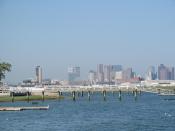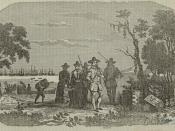John Winthrop (1588-1649) was born in Edwardstone, Suffolk, England on January 12th, 1588 to Adam and Anne Winthrop. In 1602, he attended Cambridge and Trinity College. However, Winthrop did not graduate. After attending these two colleges, he began to study and practice law. In 1623, Winthrop became an agent in the Court of Wards and Liveries. He experienced a spiritual awakening which is a requirement of being predestined in the Puritan faith. He then met many upper leaders of the Puritan church. In 1629 he joined in the ÃÂCambridge Agreement,ÃÂ which was the statement expressing the relocating to New England (Hosraer, 17).
On October 20th, 1629, Winthrop was chosen ÃÂGovernor and Company of the Massachusetts Bay in New England.ÃÂ From England, he traveled on the ship ÃÂArbellaÃÂ in 1630, reaching Salem, Massachusetts on June 12th of the same year. Many Puritan immigrants were with Winthrop on the voyage to Salem.
Winthrop settled in Boston, Massachusetts in the fall of 1630. He helped form the First Church in Boston on July 30th, 1630. Winthrop built a nice home in Boston and lived there until his death.
Winthrop was married on four occasions. He married his first wife, Mary Forth, on April 16th, 1605. She had six children. The eldest son, John Winthrop Jr., later became the Governor of Connecticut from 1606-1676. Mary Forth died on June 26th, 1615. On December 6th, 1615 he married Thomasine Clopton. She died in child labor only a year later. He married Margaret Tyndal on April 29th, 1618. She came to New England later in 1631. She had eight children, and died on June 14th, 1647. In 1647/8, he married Martha Coytmore. They had one son together.
John Winthrop's life in New England dealt primarily with the Massachusetts colony. He was elected twelve times as the...



John Winthrop
The writing in this essay is relatively pedestrian, neither so bad as to warrant condemnation, nor so good as to warrant strong praise.
What this essay fails to do is to convey any real feeling for why Winthrop is important. The basic facts are here, but they are presented in such a lifeless way that it says nothing.
Also, the essay fails to mention some of the things that make Winthrop famous. For example, he is the author of the ""City upon a Hill" sermon, one of the critical foundations of the concept of American exceptionalism, a concept that remains very important, most recently figuring prominently in Sarah Palin's stump speeches.
On the other hand, Winthrop was a very strong opponent of democracy, insisting that the only safe government for the colony of Massachusetts was an aristocracy.
2 out of 2 people found this comment useful.